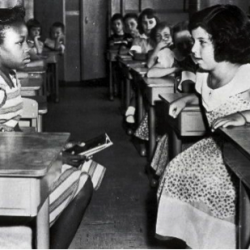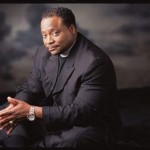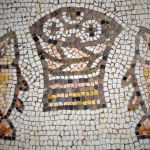I knew something was wrong in the way that he said my name. “Honey,” he said, “did you hear about a stabbing in Highland Park?” I said, yes I had but the news didn’t share anything other than the fact that the husband was dead and that the wife was in the hospital. “Maria, that was Rod and Dina.” My head started spinning. No, not Rod and Dina! What happened? Was it a break in? Where were the kids?
The Steeles are staples of our church and friends of our family. We had just been in their house in May for our annual tradition of tea, which celebrated Dina and her mother’s trip with my husband to Wesley’s England. They were one of the first families to embrace the interracial marriage between me and Jeff. More importantly, they were staples of our youth ministry, their children were beloved, and their footprint in the community was even larger. As the news spread that it was a tragedy at the Steele home, people gathered around the crime tape and prayed.
I watched our church go from the “Methodist Church” to the neighborhood church. Our staff was there beside Dina and the kids within moments of notification. They didn’t ask questions, they didn’t assign blame, they did what they were called to do–be the living embodiment of Christ in the midst of despair. Our communication team, made sure that the message got out, that our doors were open for those dealing with the grief and shock of realizing that a man who had just led over 100 children through confirmation, had first attacked his wife and then turned the knife on himself. People who were not members of our congregation heard it on the streets, on the news, and at the coffee shop, that HPUMC was everybody’s church and if you needed to talk, or sit or just pray–we were here.
My husband, despite hearing of Rod’s death only two hours before, stood in front of a crowd and presented the Heart House with a $10,000 check for their junior high school facilities. As he proclaimed a faith in a living God who sought the safety and protection of all God’s children only I knew that he was re-living all the times he joked and shared with Dina and Rod and slowly coming to grips that Rod would not be taking the pictures of our visits to his house any longer. Yet, he refused to skip this luncheon because of the testimony it would provide to the community. When we parted after lunch, he went to Dina’s bed-side and I drove around her house and prayed.
As we prepared for the prayer service the next day, our friends at University Park United Methodist sent us dinner, knowing that it would be a long night. Friends from across the Methodist Connection, called, facebooked, prayed, and reached out. Lay women walked about the house, praying and cleaning. Meals were cooked. Calls were made. Counselors were called. Staff cancelled vacation or came back early. As I moved from task to task, greeting those who came for prayer; hugging those who seemed lost; and holding my husband after a homily that reminded us that death does not have the final say, I was, for the first time, in a very long time proud to be a Methodist woman.
Be clear, I am not having a Michelle Obama moment. I love being a Methodist, I have just been really frustrated of late. So watching us be the Body was exciting and refreshing. I am not just extolling the outstanding work of my colleagues and friends at Highland Park. I know this kind of in the ‘world’ making a difference ministry is happening all over this country and world. It is what Katie Klein is all about as she ministers to bikers in Denton. Its what Rhoda Howell is about in Georgia and Jay Voorhees is about in Tennessee. Its what Rebecca is doing in New York, Telley in South Carolina, and Greg is doing in New Mexico. In Minnesota, the United Methodist Churches are providing shelter and flood buckets. In Colorado, we are standing on the front lines with those who have lost their homes. But I had forgotten this reality. Perhaps for too long I had focused on what was wrong and not what was right. Perhaps I had failed to see that our fundamentals were still strong, even if there were hidden underneath the muck of administrative mediocrity and mendacity. It is so easy to forget that at our heart: we are good neighbors.Its not that we are the only denomination that does this but we are the only one founded on the principle of that the world is our parish. As a fundamental element of who we know ourselves to be, we remain ready to reach out and take care of those in need. It is perhaps our most lasting and visible connection to the vision of John Wesley and it is sadly the one that too often that some of our leaders ignore.
This week, the South Central Jurisdictional Conference will convene in Oklahoma City. Yet before we can get started, on Monday the show down between Bishop Earl Bledsoe and the Committee on the Episcopacy will take place. Bus loads of laity and clergy, teams of lawyers and advocates will descend upon St. Luke United Methodist Church to ‘fight’ for or against the Bishop to retain his job. Despite Wes McGruder’s urging that I ‘spell’ out my position on this whole debacle, up until now I have resisted. I have been coy, strategically ambiguous, and danced around the issue.
Well, Wes, here it is: I am mystified how in the battle for life or death, for souls won and lost; people fed or hungry that we as a conference have the time to put this much energy focused on one individual’s job. Frankly, I am beyond the point of caring about the outcome of Monday, because this week I was reminded what is really at stake. Bottom line: ministry is not about vestments; its not about parking spaces; its not about appointments, or managerial style– its about answering the call to preach the Gospel of Jesus Christ to a hurting world. Not one of the hours spent fighting over Bishop Bledsoe’s future is going to make a difference to Dina Steele and her children as they try to come to grips with the loss of Rod. All the pie charts in the world about vital congregations and membership growth, will make sure that little Rosa has a safe place to go while her mother works those two jobs to keep a roof over her head. Arguments about managerial style and miscommunication will not help the drought stricken farmer who doesn’t know whether to sell or to stick it out. Honestly, I am having a hard time justifying the opportunity cost to defend someone’s employment when the DFW unemployment rate is 7.1% and the rate of unemployment for African American males is 17.5% and less than 40% of our kids are graduating from high school. I have a hard time understanding the need to take busloads of folks to Oklahoma City, when those same folks could build a house or a new youth facility for Katie Klein’s church so that they don’t have to fight it out with the yellow jackets and wasps just to have Bible Study. The lawyers taking their day off to work pro-bono, well I am sure there are some young men and women who need your counsel more desperately.
Call me old fashioned. Call me naive. Call me politically suicidal but I am just not sure any of the events of Monday will feed, clothe, school, house, or transform one life OUTSIDE OF THE CHURCH. And please don’t give me the ‘ordering the church’ argument. It is amazing to me how John, Charles, and a rag tag band of laity were able to spread Methodism without a general agency in charge of discipleship, travel, or expense reports. Let’s not confuse the HUMAN invention of the organization with the Divinely appointed call of the Body of Christ. While the Church of England wanted to fight about procedures, policies, etc., Wesley was off doing the work of the prophetic and ministering to thousands while churches were empty. I believe in efficient, well run organizations–but they can only be that way when the leaders remember that they are servants appointed only for a short time to further the MISSON of the Church.
If you were expecting me to take sides, I won’t and I can’t. There is too much blame to go around and frankly too much work to do. I’ve got some neighboring to do!















